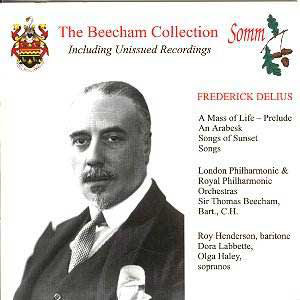There’s sorrow on the wind, my grief,
There’s sorrow on the wind.
Fiona Macleod’s I-Brasil inspired one of Delius’
most touching settings but no grief attends to the record buyer who
invests in this disc devoted to the composer’s settings for voice and
presided over by Sir Thomas Beecham. Not the least of the reasons is
the release of the live Leeds Festival recordings of October 1934 in
which Roy Henderson was prominent in the Arabesk and Songs
of Sunset, where he was joined by the inter-War stalwart Olga Haley.
The Songs with Beecham himself as pianist and soprano Dora Labbette
have been unavailable for some time now and this is apparently their
first incarnation on CD.
But the disc opens in rousing fashion with the purely
orchestral Prelude to Part Two of A Mass of Life. Also never
before issued on CD this 1938 recording displays all the LPO virtues
of elegance of string texture, wind interplay and personalisation of
tone, and although the percussion is a little muffled in the balance
this is a winningly cogent reading. An Arabesk is in excellent
sound considering its age, the circumstances, still somewhat unclear,
concerning its recording and its obvious rarity. Henderson himself is
in musicianly form, clean, clear of diction and with good intonation.
The following day Henderson was joined by Olga Haley for a performance
of Songs of Sunset of which the last, the Dowson song They
are not long, the weeping and the laughter was thought not
to have survived but discovered since the issue of this CD. Somm have
instead substituted a 1946 performance by Nancy Evans and Redvers Llewellyn
– itself unissued and part of the complete cycle (now reissued complete
as a coupling with the off-air version of the Delius and Beecham A
Village Romeo and Juliet). The balance is not quite ideal in 1934
and one can hear some audience coughs as well as some surface noise
but these are minor details, insignificant in the bigger picture. We
can certainly appreciate the oboe’s winding melodies in Pale amber
sunlight and the fine contribution of the London Select Choir. The
orchestra is very slightly recessed but Beecham sensitively shapes its
contours and ensures that the solo violin, Paul Beard I assume, is audible
in his own line. Haley has a flexible soprano with a well-sustained
and supported lower register and in Exceeding sorrow her portamentos
and prominent and attractive vibrato are admirable. Beecham moulds the
ebb and flow of the strings in See how the trees with expressive
shadings and there is something exceptionally touching about I was
not sorrowful – Henderson is unsentimental and understated and all
the more effective for it. A pity about the loss of the last song but
the torso that remains is of real importance in the Beecham-Delius discography.
Dora Labbette and Olga Haley were fundamentally different
kinds of soprano. Labbette is effortlessly mobile, with a silvered top
to her compass and a tight vibrato. She had, and retained, a youthful
quality to the voice that is immediately attractive and in these songs,
accompanied by Beecham on the piano – and the four with the LPO – she
brings distinguished credentials to her performances. She shades and
colours Whither, is romantically affectionate in The Violet
and possesses in abundance the kind of sophisticated simplicity
necessary for I-Brasil. It’s a shame that a rather sub-standard
copy of Le Ciel est par-dessus le toit has been used – too many
ticks. But these songs are beautifully sung and shaped and whether in
the orchestral settings of 1938 or the piano-accompanied 1929 (recorded,
incidentally, shortly before the Delius Festival of that year) necessary
additions for the Delian shelves. Transfers are generally excellent
and notes to the point. Recording details are clearer and more typographically
helpful than has sometimes been the case in this series but whilst matrix
numbers are given 78 issue numbers, where relevant, are not. Needless
to say, however, a notably successful and important disc.
Jonathan Woolf


